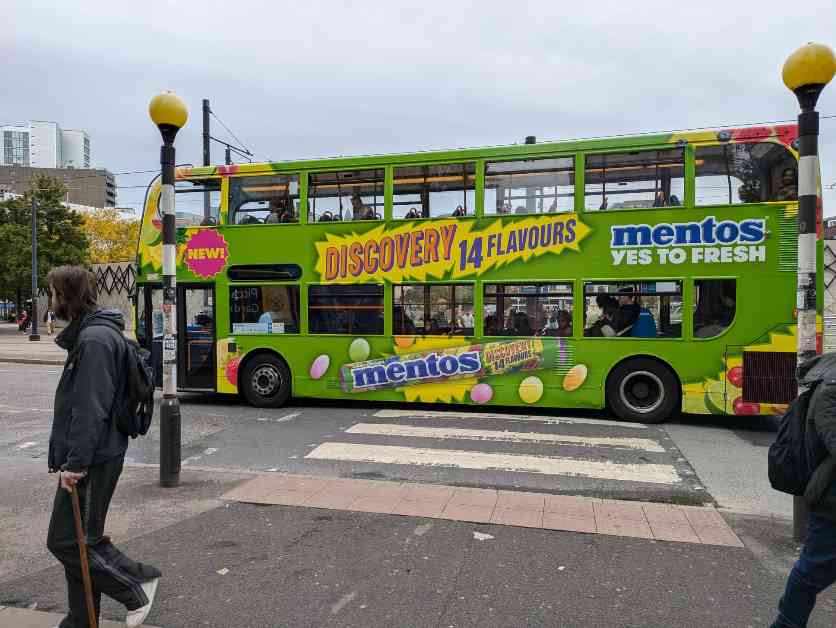Nine mayors across the UK, including Greater Manchester’s Andy Burnham, have recently pledged to ban the marketing of junk food on public transport. This decision, aimed at reducing childhood obesity, will impact buses, trams, and other areas under the control of these mayors. The move has sparked mixed reactions among residents in Manchester, with some expressing support for the policy while others voice concerns about personal freedom and the potential impact on eating habits.
Support for the ban comes from individuals like Rob Williams, a 49-year-old resident of Manchester, who believes that reducing fast food advertising is a positive step. Williams mentioned that children, including his own 11-year-old daughter, are often influenced by junk food advertisements they see on TV and billboards. This sentiment is echoed by Nasir Akram, Director of the Bolton boxing gym Round4Round, who regularly encourages young people to maintain a balanced diet. Akram shared that the gym sees 450 young attendees each week, many of whom are tempted by the abundance of fast food adverts they encounter.
However, not everyone in Manchester is in favor of the ban. Some young adults, like 21-year-old Milly Overland, argue that individuals should have the autonomy to make their own dietary choices without government intervention. Overland highlights the potential negative consequences of labeling foods as ‘good’ or ‘bad’, suggesting that such distinctions could contribute to eating disorders. Caiden Ward, a 17-year-old resident, also believes that moderation is key when it comes to consuming junk food, especially considering its affordability for many individuals. Ward points out that food brands often target children, citing the example of Lunchly, a school lunchbox-filler developed by influencers KSI and Logan Paul.
The ban on junk food ads on public transport aligns with a broader central government policy that restricts such advertisements online and on TV before 9pm. This policy covers a range of food items including soft drinks, sweets, breakfast cereal, cakes, pizza, potato products, and more, as reported by the BBC. In addition to Greater Manchester, mayors from the Liverpool City Region, North Yorkshire, West Yorkshire, South Yorkshire, and the North East have also committed to implementing these restrictions. The influence of youth activist group Bite Back, which aims to challenge the current food system, played a significant role in pushing for these bans.
Mayor Andy Burnham emphasized the importance of supporting young people by limiting the influence of junk food adverts. He stated, “Our young people deserve the best possible start in life, and that means leaders speaking as one and taking action where we can to limit the influence of junk food adverts.” Burnham’s stance reflects a growing awareness of the impact of advertising on dietary choices, particularly among children and adolescents.
Public Health Impact
The ban on junk food advertising on public transport is a significant step towards addressing the issue of childhood obesity. According to the World Health Organization (WHO), childhood obesity is a major public health concern that can lead to various health problems in later life, including diabetes, heart disease, and certain cancers. By reducing the exposure of young people to advertisements promoting unhealthy food choices, policymakers hope to encourage healthier eating habits and ultimately improve the well-being of the population.
Ethical Considerations
The debate surrounding the ban on junk food ads raises important ethical considerations regarding personal autonomy and government intervention. While some argue that individuals should have the freedom to make their own dietary choices without interference, others believe that government action is necessary to protect public health, especially when it comes to vulnerable populations like children. Finding a balance between promoting individual autonomy and safeguarding public health remains a challenging task for policymakers.
Economic Implications
The ban on junk food advertising may have economic implications for food companies that rely heavily on marketing to promote their products. While some argue that restricting advertisements for unhealthy foods could lead to a decline in sales and revenue for these companies, others believe that it could incentivize them to produce healthier alternatives. Additionally, the ban may create opportunities for businesses that specialize in nutritious food options, ultimately contributing to a more diverse and health-conscious food market.

